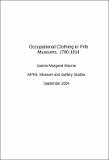Occupational clothing in Fife museums, 1790-1914
Abstract
This thesis surveys the holdings of occupational clothing in Fife museums' collections and considers whether they form a representative selection in relation to the occupational structure of Fife between 1790 and 1914. Occupational clothing is defined as any clothing worn by an individual in the course of their work, specialised or not. Uniforms of a national nature, for instance those of the police force and railway employees, are not considered, only those related specifically to Fife. Through the use of statistical accounts, census returns and trade directories, an occupational profile of Fife during the period has been constructed. The four main areas of employment - agriculture, textiles, mining and fishing - are dealt with in some detail and other trades and occupations are mentioned where specific or specialised garments can be associated with them. Information from surviving garments is supplemented by the study of fine art and photographic images. The holdings of occupational garments are minimal. The problems of survival of textiles and the tendency for museums to concentrate their often haphazard costume collecting on finer garments have exacerbated this situation. The possibilities of active collecting of occupational garments and cooperation between institutions on this matter are investigated.
Type
Thesis, MPhil Master of Philosophy
Collections
Items in the St Andrews Research Repository are protected by copyright, with all rights reserved, unless otherwise indicated.

